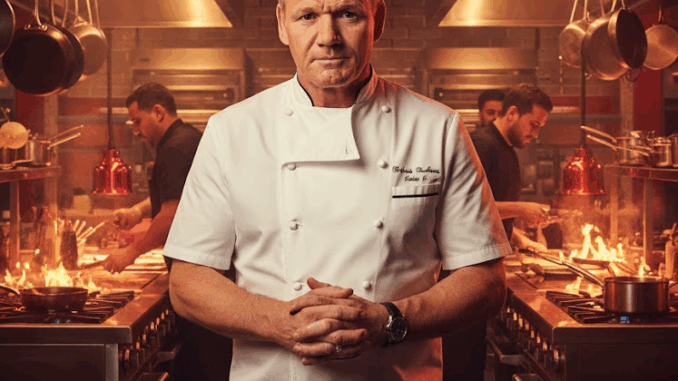
It’s official — Hell’s Kitchen isn’t just the hottest cooking competition anymore. According to new polls and fan forums, Gordon Ramsay’s legendary show has just been voted the most addictive cooking series ever made. But behind the applause, there’s a growing debate: has Hell’s Kitchen crossed a line in its quest for drama?
Over two decades since it first hit television, Hell’s Kitchen continues to dominate global viewership charts. The show’s 23rd season brought in record-breaking engagement online, with TikTok clips of Ramsay’s iconic outbursts racking up millions of views within hours. Fans say no other show captures the same mix of chaos, skill, and raw emotion — it’s part competition, part psychological warfare, and 100% Ramsay.
Yet, not everyone’s cheering. Critics and former contestants claim that the latest seasons have become “too extreme,” focusing more on emotional meltdowns and heated arguments than culinary craft. One former participant, speaking anonymously, described the environment as “a pressure cooker where emotions are currency.” Others argue that’s exactly what makes it so compelling — it’s not just about cooking; it’s about who survives the heat.
Ramsay himself has responded to the controversy with his usual blunt charm. During a recent interview, he laughed off claims that Hell’s Kitchen had lost its heart. “We’re not making a bedtime show,” he said. “This is real life. Real kitchens. Real fire.” And that’s exactly what fans tune in for — the authenticity of Ramsay’s world, where excellence is demanded, and weakness gets no mercy.
But here’s where it gets interesting. A behind-the-scenes leak from FOX’s production team suggests that the next season — rumored to debut in 2026 — could feature a “global all-star edition.” Contestants from the U.S., U.K., and even Australia are said to be returning for a world-scale culinary showdown. Early reports claim it will be filmed across multiple countries, pushing contestants (and Ramsay) beyond anything they’ve done before.
Industry insiders say the success of Hell’s Kitchen lies in its evolution. “Every time viewers think they’ve seen it all, Ramsay reinvents the formula,” says TV critic Dana Frost. “He’s not afraid to raise the stakes — even if it means shocking his audience.”
But with record success also comes scrutiny. Social media has been buzzing with claims that producers manipulate contestant rivalries to create drama. Some fans believe the editing has become “too cinematic,” turning genuine competition into reality-TV spectacle. Still, the majority don’t seem to care. “We watch for Gordon,” one fan commented. “It’s not about the food anymore — it’s about the fire.”
And that’s the secret ingredient. Ramsay, love him or hate him, has managed to turn anger into art. His fiery rants have become meme material, his phrases iconic (“It’s RAW!” now printed on t-shirts worldwide). Yet underneath it all, there’s always a purpose — pushing people past their limits, uncovering talent they never knew they had.
As Hell’s Kitchen prepares for what’s expected to be its biggest season yet, one thing is certain: Ramsay’s empire shows no signs of cooling down. Whether it’s the competition, the chaos, or the charisma, fans can’t look away — and neither can his critics.
After all, in a world obsessed with perfection, Gordon Ramsay built an empire on imperfection — loud, unapologetic, and gloriously human.